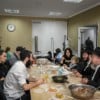As many wrap up their final Passover shopping—picking up some more kosher chicken, a few extra pounds of shmurah matzah and bottles of wine or grape juice for the Seder—Judi Garrett’s holiday list looks a little different. Hers includes more than 61 tons of matzah, 50,000 bottles of grape juice, and nearly 20,000 food packages. The chief operating officer of Chabad’s Jewish Relief Network Ukraine (JRNU), Garrett is coordinating the distribution of Passover packages across the war-torn country.
JRNU’s mission is part of a global Chabad-Lubavitch effort, inspired by the call of the Rebbe—Rabbi Menachem M. Schneerson, of righteous memory—to ensure that every Jew has matzah and the means to celebrate Passover. Every year, Chabad rabbis around the world distribute hundreds of thousands of pounds of matzah. In Ukraine, where a local matzah bakery still operates, the ongoing war has left much of the Jewish population in urgent need—not only of ritual foods but of basic necessities for daily survival.
Working closely with Chabad emissaries across Ukraine, JRNU is racing against time to get these Passover essentials into the hands of tens of thousands of families. But their work extends far beyond logistics. The rabbis are also offering spiritual strength and emotional support to communities battered by conflict.
When Passover begins on Saturday evening, April 12, Chabad centers throughout the country will open their doors to host public Seders—welcoming tens of thousands to a celebration of freedom and resilience in the face of unimaginable hardship.
Garrett notes that while Chabad has been providing this kind of assistance since the fall of the Soviet Union, the need has grown exponentially in recent times.
“We just marked three years since the war began, and the Jews of Ukraine need our support and solidarity more than ever,” she says. “In addition to the constant fear and uncertainty from ongoing attacks, there’s been a noticeable rise in anxiety in recent weeks due to the shifting political landscape.”

On the Ground
While Garrett oversees operations from the United States, the on-the-ground logistics in Ukraine are coordinated by Rabbi Simcha Levenhartz of Chabad of Kyiv. He manages not only the massive pre-Passover distribution but also year-round aid efforts across the country.
“Our work is two-fold,” he explains. “We’re coordinating the distribution of matzah, grape juice, kosher meat and poultry, and other Passover essentials—each in quantities of tens of tons—along with complete food packages for families in need. At the same time, we’re organizing public Seders for those who have no other place to celebrate and fulfill the mitzvahs of the holiday.”
In Kyiv, that includes a large community Seder and the rental of an entire hotel for individuals who wish to observe Passover in its entirety, with all the necessary halachic accommodations.
In Odessa as well, preparations are in full swing. Rabbi Avraham Wolff, the city’s chief rabbi, is organizing a series of public Seders and events tailored to every segment of the community.
“We’ll be holding a Seder at the central synagogue, along with others throughout the city,” he says. “There will be a Seder for kindergarteners, another for school-aged children, two at the FJC Mishpacha orphanage and two more for university students. In addition, we’re planning dozens of events throughout Passover for every age group—from preschoolers to seniors.”

Trying Something New
Meanwhile, on the opposite end of the country in Lviv, near the Polish border, Passover preparations are taking a new shape.
Led by Rabbi Mendel and Frida Marysha Gottlib, the Chabad center—a vital hub for refugees fleeing the country via the gateway city in the early days of war—continues to serve both locals and those still displaced from other parts of Ukraine.
This year, instead of one large communal Seder, Gottlib is organizing four smaller, more intimate gatherings. The shift is intentional: These smaller Seders will allow for deeper engagement, more personal connections and a setting where participants can truly immerse themselves in the meaning of the holiday.
The celebrations in Lviv will start even before Passover begins.
“We’re hosting a full-day Passover seminar on the 11th of Nissan—the Rebbe’s birthday—as a tribute to his life and vision, which continues to guide and inspire our work here,” says Gottlib.
The seminar, to be held in a specially rented conference hall, will feature lectures, live Passover music, video presentations and practical workshops on how to lead a Seder. Participants will explore the meaning of the holiday and the deeper significance of the day itself—honoring the legacy of the Rebbe, whose impact continues to resonate across Ukraine, where he was born, and the entire world.
The event will also feature a model Seder to help attendees who plan to host their own, giving them practical guidance and confidence to lead the evening properly. Another key focus will be the often-overlooked custom of selling chametz before the holiday begins.
“Almost everyone knows about eating matzah,” says Gottlib, “but many aren’t aware that the Torah also commands us to remove all chametz—any leavened products—from our possession. One way to fulfill this is by selling chametz to a non-Jew through a competent rabbi for the duration of Passover.”
Hosting the seminar in advance of the holiday, he explains, allows them to educate participants on this critical mitzvah—something that must be done before Passover begins, long before people show up for the Seder.
“At the end of the day, every participant will go home with a complete Seder kit,” says Gottlib. “Matzah, wine, a kiddush cup, a Seder plate, a Haggadah and a guide with clear, simple instructions to help them lead a Seder on their own or with family and friends.”
He adds that they’re expecting several hundred participants over the course of the day, with rotating groups of 80 to 100 people at a time. “With G‑d’s help,” he says, “this initiative will transform the way Passover is celebrated in Lviv.”

More than Ever
Back in the United States, Garrett is working around the clock to ensure that despite the ongoing war, more Jews in Ukraine than ever before will be able to celebrate Passover.
“Since October 7, and increasingly in the months since, we’ve seen a noticeable uptick in participation across Jewish communities,” she says. “People aren’t just coming for humanitarian aid or holiday packages—they’re bringing their children to school programs and youth groups, attending social events, joining Torah-study sessions and showing up to synagogue in greater numbers. Shabbat services are fuller, and this year’s Purim celebrations were the largest we’ve ever seen. The need for connection—for spiritual and emotional support—is readily apparent.”
That surge in engagement is what fuels the continued efforts of JRNU and the Chabad rabbis in Ukraine. “For the fourth year in a row,” Garrett says, “our staff and volunteers are working tirelessly to make sure every Jew in Ukraine can celebrate Passover with dignity and joy.”
“We’re deeply grateful to our generous donors who make this work possible and to the Chabad rabbis, their wives and families, and all the staff and volunteers who give their all,” Garrett says. “With G‑d’s help, next Passover the Jews of Ukraine—and Jews around the world—will be celebrating in peace.”








Start a Discussion